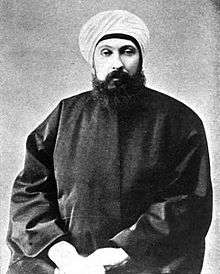Mehmet Cemaleddin Efendi
Mehmet Cemaleddin Efendi (1848–1917) (Ottoman Turkish: محمد جمال الدین افندی[1]) was a senior judge of the Ottoman Empire.
Shaykh ul-Islam | |
|---|---|
 Shaykh ul-Islam Mehmet Cemaleddin Efendi during the reign of Sultan Abdul Hamid II | |
| Personal | |
| Born | 1848 |
| Died | 5 April 1917 (aged 68–69) |
| Religion | Islam |
| Denomination | Sunni |
| Jurisprudence | Hanafi |
Biography
His father, Sheikh Yusufzâde Hâlid Efendi,[1] was a member of the judiciary and served as Kazasker and as a minister. His mother was a member of the Kevabibiye family and a daughter of Mehmed Said Efendi.
Mehmet Cemaleddin was educated in Ottoman and Islamic law, and served in the Ottoman judiciary as Kadi (Chief Judge) of Constantinople in 1884. He was appointed Chief Judge of Anatolia (Anadolu Kazaskeri) in 1888 and Chief Judge of Rumelia, the European parts of the Ottoman Empire in the Balkans, in 1890. On 4 September 1891, at the age of 43, he was appointed Şeyhülislam, the Cabinet Minister in charge of religious and legal matters. He remained in this post for 16 years and 11 months, and was later reappointed on three other occasions for shorter periods, holding this post for a total of nearly 18 years, and becoming the second-longest holder of this post in Ottoman history, after Ali Zembilli Efendi. His son-in-law was the noted Turkish surgeon and mayor of Constantinople Prof. Cemil Topuzlu, also known as Cemil Pasha, whose name was given to a major boulevard in modern Istanbul, "Cemil Topuzlu Caddesi" and to a municipal amphitheatre Cemil Topuzlu Harbiye Amphitheatre. Mehmet Cemaleddin's younger brother Ibrahim Sami Bey, was a member of the Ottoman Council of State or Şura-yı Devlet whose grandson Erol Gelenbe is the ``Dennis Gabor Chair Professor at Imperial College, London.
An opponent of the pro-German and war-oriented policy of the Union and Progress Party, Mehmed Cemalettin Efendi was exiled to Egypt in 1913, and died in Ramleh, Egypt, on 5 April 1917, at the age of 79. When his body was brought to Constantinople, it lay in state at the Topkapı Palace, and he is now buried at the Edirnekapi Shehitlik Cemetery. His memoirs were first published in Constantinople in 1920, and then edited by Selim Kutsan and re-published in modern Turkish under the title Siyasi Hatiralarim (My Political Memoirs), by the publisher Nehir Yayinlari (Istanbul) in 1990.
Selected bibliography
- Cemaleddin Efendi "Siyasi Hatiralarim" from the Ottoman Turkish original, "Hatirat-i Siyasisi", Istanbul 1920, Selim Kutsan (ed.), Publisher, Nehir Yayinlari: 43, Hatiralarla Yakin Tarih Dizisi: 4, Istanbul, 1990.
Notes and references
- İsmail Hâmi Danişmend, Osmanlı Devlet Erkânı, Türkiye Yayınevi, İstanbul, 1971, p. 158. (in Turkish)